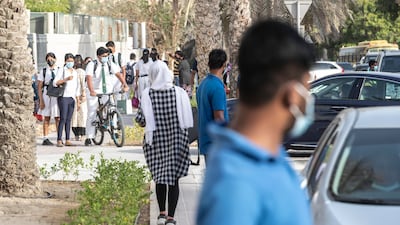Opportunities for career advancement, a focus on well-being and a sufficient work-life balance are key to retaining teaching talent in the Emirates, school heads have said.
Studies in recent years have highlighted high turnover rates in UAE schools, an issue that education leaders said was exacerbated by the Covid-19 pandemic, which led many homesick teachers to depart for their countries .
A World Bank report, Collaboration Road: Dubai's Journey towards Improved School Quality, published in March 2019, showed that some schools had an annual staff turnover of 30 per cent to 40 per cent.
A healthy turnover of teachers internationally is commonly accepted at about 10 per cent to 20 per cent, said experts.
The National spoke with school principals on the sidelines of a panel discussion on staff retention at the Gulf Education Supplies and Solutions Conference in Dubai.
“Teachers move because there is a lack of opportunity and if strong professional development is not in place," said Mark Leppard, headmaster at British School Al Khubairat in Abu Dhabi.
“The culture at the school is a factor. They are professionals and want to feel trusted.
“Salaries have to be competitive and attractive but most research does not say teachers move for a huge rise in salary.”
Drawing a line under the school day
He said it was important that schools focus on teachers' well-being.
“We have done a huge amount on work-life balance and have email protocols. We do not allow staff to send emails after 5.30pm and before 6.30am. Parents can send emails in but there are no expectations that staff will answer these," he said.
"We have no emails over the weekend unless in exceptional circumstances. The day before payday we have free coffee at the coffee shop. We have regular staff lunches and activities, and compassionate leave."
Earlier this year, The National reported that private schools across the UAE were taking steps to reduce the workload of teachers faced with an "increased burden" during the Covid-19 pandemic.
Even before the pandemic, The National reported that long hours and heavy workloads were pushing UAE teachers into abandoning the private sector for government schools.
British School Al Khubairat has a staff turnover rate of about 7 to 12 per cent every year. Three main reasons why teachers leave are moving back to their home countries, people opting for promoted posts, and moving to other countries for work.
Mr Leppard said he encouraged staff to look for opportunities every year as he thought it was a healthy practice.
Losing a school's identity
For schools that have a high turnover rate of 30-40 per cent, Mr Leppard said it could effectively mean that their entire staff body had changed over a period of three years.
"That is a massive impact because you lose the culture of the school and potentially lose continuity," said Mr Leppard.
He said that when pupils did not have the same teachers year on year, teacher-pupil relationships were affected.
"If the pupils are continuously trying to find out about a new teacher or a teacher is trying to find out about new pupils that will slow down academic progress," he said.
He said if the school had their staff turnover under control it did not matter if it was high or low.
While a school may want a high turnover in a particular year as they wish to refresh things, he said, if there is a continuously high turnover, the school has to look internally at what they’re doing and ask why this is happening.
Robert Welsh, a teacher in the Emirates and founder of Teacher Socials, a support group in Dubai said teachers left schools because they were unhappy, could not find work-life balance and due to salaries.
Staff well-being is being neglected by some schools in the UAE, said Mr Welsh, adding that teachers can be overworked leaving little time to recharge.
Other problems include too much administrative work and having to work with management that do not remember what it is like to be in the classroom, he said.
Mr Welsh stressed that more focus on well-being is needed.
“It’s 100 per cent needed as teachers are overwhelmed, overworked and unappreciated.”
Create a positive culture
Fiona Cottam, principal of Hartland International School in Dubai, said it was crucial to be aware of staff morale levels.
"If you want to get staff to buy into you, you have to buy into staff as well," said Ms Cottam.
"If they are working in a positive culture they tend not to leave."
She said a slight amount of flux and change would help to inject fresh ideas into a school.
"If people are happy at work, feel supported, see there are opportunities to develop and grow, they will stay with you," she said.
"It’s about making sure you create a happy community, where people feel trusted and there is empathy, open dialogue, and discussion."
The staff turnover rate at the school is below 10 per cent.
The school has a well-being committee, which runs initiatives and campaigns such as breast cancer awareness drives with free mammograms and screenings for teachers, or staff breakfasts and weekly gifts.
Victoria James, regional head of development at Tes Institute, advised schools to retain staff by investing in their professional development as that improved their overall well-being, could help teachers take the next step in their careers, and also empowered them financially.




































